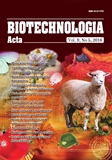"Biotechnologia Acta" V. 9, No 5, 2016
https://doi.org/10.15407/biotech9.05.024
Р. 24-29, Bibliography 14, English
Universal Decimal Classification: 579.222

LYOPHILIZATION EFFECT ON PRODUCTIVITY OF BUTANOL-PRODUCING STRAINS
O. O. Tigunova, N. E. Beiko, A. S. Andriiash, S. G. Priymov, S. M. Shulga
SO ?Institute of Food Biotechnology and Genomics? of the National Academy of Sciences of Ukraine, Kyiv
Investigation of lyophilization effect on the productivity of butanol-producing strains was the aim of our research. For this purpose we used butanol-producing strains; technical glycerol; biomass of switchgrass Panicum virgatum L. Lyophilization was performed using a lyophilization-drying. The effect of the protective medium on residual moisture of freezedrying cultures suspensions depending on the concentration of glucose and sucrose was studed.
It was shown that the lowest residual moisture was attained by using glucose and sucrose in amount of 10% and if the samples of freeze-drying bacteria had been saved for one month at 4 OC the productivity did not decrease. As temperature preservation was increased the productivity of the cultures was gradually decreased and it was greatly reduced at 30 OC. So the protective medium composition was optimized for lyophilization of butanol-producing strains as follows: sucrose 10.0%; gelatin 10.0%; agar 0.02%. It was shown that the preservation of samples of freeze-drying bacteria for six months at a temperature of 4 OC did not affect the productivity of strains. It was found that cultures could use glycerol as a carbon source for butanol accumulation before lyophilization.
Key words: butanol, producing bacteria, lyophilization.
© Palladin Institute of Biochemistry of the National Academy of Sciences of Ukraine, 2016
References
1. Mackevich N. V. Spontannaja izmenchivost' i kariologija nesovershennyh gribov. Moskva: Nauka. 1981, 184 p. (In Russian).
2. Filippova S. M., Kuznecov V. Ju., Badjautdinov D. N., Ryskov A. P., Vasil'ev V. A., Danilenko V. N. Izuchenie vnutripopuljacionnyh spontannyh morfologicheskih variantov Streptomyces oligocarbophilus ISP5589. Mikrobiologiya. 1999, 68 (3), 375?382. (In Russian).
3. Ganbarov H. G., Abdulgamidova S. M. Izuchenie vnutripopuljacionnyh morfo-kul'tural'nyh izmenenij drozhzhevyh gribov, hranivshihsja v kollekcii kul'tur. Vestnik Bakinskogo Gosudarstvennogo Universiteta, seriya biologicheskikh nauk. 2007, V. 1, P. 42?46. (In Russian).
4. Kupletskaja M. B. Arkadjeva Z. A. Metody dlitel'nogo hranenija kollekcii mikroorganizmov kafedry mikrobiologii MGU. Mikrobiologiya. 1997, 66 (2), 283?288. (In Russian).
5. Stojanova L. G., Arkadjeva Z. A. Sravnenija sposobov hranenija molochnokislih bakterіj. Mikrobiologiya. 2000, 69 (1), 98?104. (In Russian).
6. Fermandez-Segovia I., Escriche A., Fuentes A., Serra I. A. Microbial and sensory changes during refrigerated storage of desalted cod (Gadus morhua) preserved by combined methods. International j. of food Microbiology. 2007, 116 (1), 64?72. (In Russian).
7. Mihajlova R. V., Semashko T. V., Lobanok A. T., Osoka O. M. Spontannaja izmenchivost' Penicillium feniculosum – producenta gljukozooksidazy. Mikologiya i fitopatalogiya. 2001, 35 (3), 73?79. (In Russian).
8. Abdulgamidova S. M., Ganbarov H. G. AVyzhivaemost' drozhzhevyh kul'tur pri hranenii v kollekcii na suslo- agare. Sbornik nauchnykh trudov Instituta mikrobiologii NAN Azerbaydzhana. 2007, V. 4, P. 34?39. (In Russian).
9. Osadchaja A. I., Kudrjavcev V. A., Sofronova L. A. Vlijanie nekotoryh faktorov na kriorezistentnost' i sohranenie zhiznesposobnosti pri liofilizacii kul'tur Bacillus subtilis. Biotehnologiya. 2002, V. 3, P. 45?54. (In Russian).
10. Golovach T. N., Groma L. I. Influence of cryopreservation and lyophilization on exopolysaccharide synthesis and viability of Хantomonas campestris pv. campestris ІМВ В-7001. Mіcrobіol. j. 2013, 75 (1), 14?21. (In Russian).
11. Lysenko Ju. A., Luneva A. V., Volkova S. A., Nikolaenko S. N., Petrova V. V. Podbor optimal'noj pitatel'noj sredy dlja kul'tivirovanija, koncentrirovanija i vysushivanija kletok Lactobacillus Acidophilus. Nauchnyy zhurnal Kub. GAU. 2014, 102 (08), 1?11. (In Russian).
12. Tigunova O. O., Shulga S. M. New producer strains of biobutanol. ІІ. Fermentacіja lіgnoceljuloznoї sirovini. Biotechnologia Acta. 2014,7 (4), 54?60. (In Ukrainian).
13. Lakin G. F. Biometrija. Moskva: Vyssh. shkola. 1990, 352 p. (In Russian).
14. Tigunova O. O., Shulga S. M. Using by mutant strains C. acetobutylicum ligno-cellulosic material as a substrate. Microbiol. Biotech. 2015, V. 3, P. 38?46.

